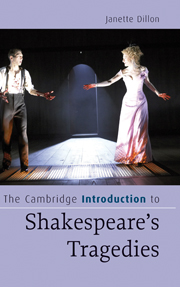Book contents
- Frontmatter
- Contents
- Acknowledgements
- Introduction
- Chapter 1 Tragedy before Shakespeare
- Chapter 2 Titus Andronicus
- Chapter 3 Romeo and Juliet
- Chapter 4 Julius Caesar
- Chapter 5 Hamlet
- Chapter 6 Othello
- Chapter 7 Timon of Athens
- Chapter 8 King Lear
- Chapter 9 Macbeth
- Chapter 10 Antony and Cleopatra
- Chapter 11 Coriolanus
- Notes
- Index
Chapter 4 - Julius Caesar
Published online by Cambridge University Press: 05 August 2015
- Frontmatter
- Contents
- Acknowledgements
- Introduction
- Chapter 1 Tragedy before Shakespeare
- Chapter 2 Titus Andronicus
- Chapter 3 Romeo and Juliet
- Chapter 4 Julius Caesar
- Chapter 5 Hamlet
- Chapter 6 Othello
- Chapter 7 Timon of Athens
- Chapter 8 King Lear
- Chapter 9 Macbeth
- Chapter 10 Antony and Cleopatra
- Chapter 11 Coriolanus
- Notes
- Index
Summary
Julius Caesar may well have been the play Shakespeare wrote for the opening of the new Globe Theatre in 1599. It was very probably the play that Thomas Platter, a Swiss visitor to London, saw in September of that year, though the argument has recently been made that it inaugurated the new theatre in the previous June.
After dinner on 21 September, at about two o'clock, I went with my companions over the water and in the thatched-roof house saw the tragedy of the first Emperor Julius with at least fifteen characters very pleasingly acted. At the end of the comedy, they danced, according to their custom, exceedingly gracefully: two attired in men's clothes and two in women's performed wonderfully with one another.
Thomas Platter, Observations on the Elizabethan Theatre (1599)Platter's account functions as a useful reminder that plays at this time, including tragedies, were normally followed by the performance of a ‘jig’, often a bawdy, comic song-and-dance routine, though this particular post-show entertainment seems to have been a more formal dance. Though we no longer know what was staged after Shakespeare's other tragedies, we do well to remember that even the most awe-inspiring tragedy might have been followed by clowning and obscenity, a point which puts the mingled dramaturgy of the tragedies themselves into a culturally specific and now unfamiliar context. Julius Caesar is possibly one of the least dramaturgically mixed tragedies of Shakespeare's composition, containing as it does only one very brief comic interlude, in the first scene, but that is one of its defining features rather than part of Shakespeare's normal way of working.
Rome and republicanism
Shakespeare returns to Rome for the setting of Julius Caesar,but not the imperial Rome of Titus Andronicus. Here the focus is on the Roman republic, and the question on which the play turns is whether Caesar has ambitions to be a king, and thereby to end the republic.
- Type
- Chapter
- Information
- The Cambridge Introduction to Shakespeare's Tragedies , pp. 52 - 64Publisher: Cambridge University PressPrint publication year: 2007

